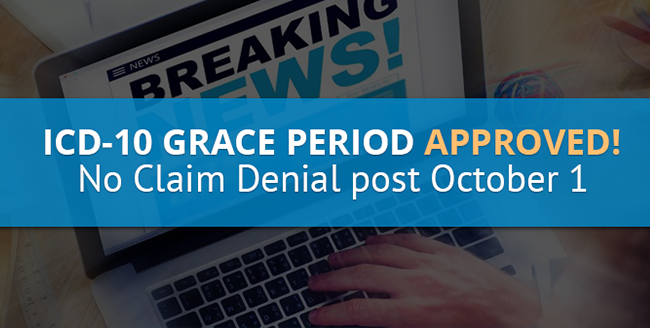In a surprise concession yesterday, CMS has agreed to a denial free grace period post-October 1, to make the ICD-10 transition easier for physicians.
Following this announcement, American Medical Association (AMA) that had been lobbying for protection for Doctors rolling out New ICD-10 coding systems, has publicly withdrawn its demand for a delay to ICD-10. AMA will now work with CMS to help providers get ready for the transition.
According to AMA’s press release the changes will address :
- Claim denials. For the first year, ICD-10 is in place, Medicare claims will not be denied solely based on the specificity of the diagnosis codes as long as they are from the appropriate family of ICD-10 codes. This means that Medicare will not deny payment for these unintentional errors as practices become accustomed to ICD-10 coding. In addition, Medicare claims will not be audited based on the specificity of the diagnosis codes as long as they are from the appropriate family of codes. This transition period will give physicians and their practice teams time to get up to speed on the more complicated code set. Both Medicare Administrative Contractors and Recovery Audit Contractors will be required to follow this policy.
- Quality-reporting penalties. Similar to claim denials, CMS will not subject physicians to penalties for the Physician Quality Reporting System, the value-based payment modifier or meaningful use based on the specificity of diagnosis codes as long as they use a code from the correct ICD-10 family of codes. In addition, penalties will not be applied if CMS experiences difficulties calculating quality scores for these programs as a result of ICD-10 implementation.
- Payment disruptions. If Medicare contractors are unable to process claims as a result of problems with ICD-10, CMS will authorize advance payments to physicians.
- Navigating transition problems. CMS has said it will establish a communication center to monitor issues and resolve them as quickly as possible. This will include an “ICD-10 ombudsman” devoted to triaging physician issues.
You can access CMS’s full guidance release here.
What does this Announcement mean for your practice?
- It only applies to Medicare.
- Other payers may follow but this is not a guideline, just a notification of what Medicare intends to do
- Other payers may not have time to change their systems if they have not allowed for the above scenario
- CMS did not discuss this in public prior to their announcement
- Medicare must have implemented this a while an ago as this is a non-trivial change to their claim processing system.
Also, mark your calendars! CMS will have a provider call on August 27th to discuss these changes.
Our Advice
Don’t hedge your bets on “no claim denials” by all payors post-Oct 1. Continue preparing for the transition by helping your providers understand new documentation needs and train for them. Training should be an ongoing process at least for the first year of the transition. Deborah Grider, author of Preparing for ICD-10 suggests
“Education and training should be at a minimum an ongoing process for the first year after ICD-10 is implemented. A simple solution is to provide “lunch and learn” sessions for one hour per month, by specialty. Such training sessions should not be the end, but just the beginning. Continue to audit and monitor patient encounters to ensure that the documentation supports the ICD-10 code selection and that providers are coding to the highest level of specificity. Make certain that you also have a denial management process in place to monitor claims after Oct. 1. These tasks should become an integral part of your operations going forward.”
Visit our Road to ICD-10 resource center. Your one-stop source for all ICD-10 related queries.
